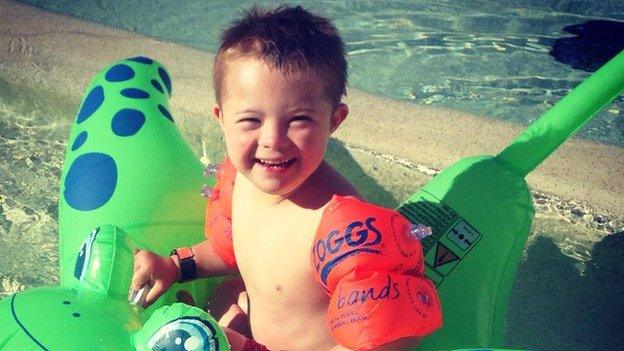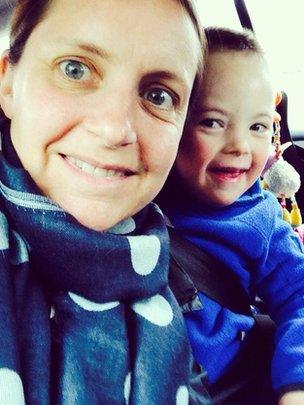'My son has Down's syndrome and I wouldn't swap a thing about him'
- Published

The case of the Australian couple accused of abandoning a baby born with Down's syndrome, has made Caroline White - whose son has the disability - determined to change attitudes.
I have been saddened by the recent coverage of baby Gammy, a child with Down's syndrome born to a Thai surrogate. It shocked me that we still attach a value to people's lives. We are talking about twin babies here. Twins, who shared a womb for nine months and share the same birthday. Yet the way they have been treated has been very different.
I am forever grateful that I did not know that my six-year-old son Seb had Down's syndrome until he was in my arms. A pre-natal diagnosis would have sent me into a frenzy of fear, but thankfully I had no choice but to get to know my baby, and fall head-over-heels in love with him. Gammy's Australian parents have said that they didn't know until late in the pregnancy that he had Down's, and his father has said that if they had he "probably" would have asked the surrogate to abort. This isn't surprising. After all, more than 90% of positive pre-natal diagnoses in the UK end in abortion.
But Seb, in six tiny years, has taught me more than any words or textbook or Facebook page ever could and I would not swap a single thing about him or our lives together. I now have a very different attitude and understanding, not just to Down's syndrome or disability, but generally in life. I now do see that we are born equals, all with our own different and unique strengths and weaknesses, we are all of equal value and it saddens me that others cannot see this.
It seems it is only those of us who have a child or relative with Down's, or those who have worked with children with Down's, who are not afraid of it.
I see everywhere we go how Seb touches people with his vibrant personality, his lust for life and giant, beaming smile. People always comment on how gorgeous he is - "a blessing". Sometimes it may be patronising, or pitying, but most of the time it seems genuine.

And Seb does stand out - but largely due to his incredible social skills and impeccable manners - not because he has an extra chromosome. Seb makes friends with other children, eats in restaurants, plays table tennis, and loves swimming.
Yet there is still talk of the "risk" of having a child with Down's syndrome. Risk is a word associated with danger. It is placing your life savings, your house and your car on one number on a roulette wheel. I have lost count of the number of friends and colleagues who have told me, excitedly, that their pregnancy is "low risk for Down's". I am not silly enough to think anyone wishes to have a child with Down's, and I would be a hypocrite for being offended. After all, I was relieved with my subsequent pregnancies too that I was low "risk". But the word hurts me because, without realising it, people are telling me they are delighted they are at a low risk of having a child like mine. Such a big deal is placed on testing for Down's that it only serves to (wrongly) send fear through those who receive a positive diagnosis. I know it did for me, at first.
If we could replace risk with "chance" I think we would make a small bit of difference.
I can't help but wonder how the people who have interacted with Seb would feel if they themselves were told they had a high risk of their child or grandchild having Down's. I imagine they'd be full of fear too, but I like to think that Seb changes outdated attitudes wherever he goes, and I am sure this is true to a point.
People need to stop placing a value on babies' lives. They cannot be treated like a commodity, an accessory and a right. Both of the twins in the Thai surrogacy case have the right to equality and the potential to enrich and change the lives of those around them for the better - as Seb does for us.
Follow @BBCOuch, external on Twitter and on Facebook, external, and listen to our monthly talk show